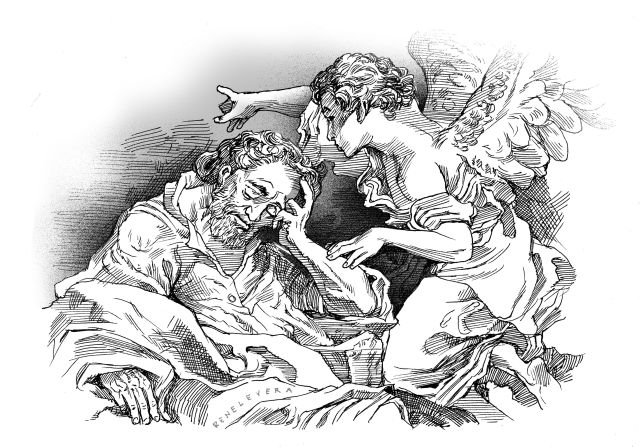
In 1794 William Blake published “Songs of Experience,” the second part of a two-volume work, the first being “Songs of Innocence.” Both were later put into a single compilation, entitled “Songs of Innocence and Experience Showing the Two Contrary States of the Human Soul.” In these volumes, Blake dwells on childhood and its disenchantments, the loss of innocence, the man’s corruption.
Among the poems included in “Songs of Experience” is “The Angel”:
I dreamt a dream! What can it mean?
And that I was a maiden Queen
Guarded by an Angel mild:
Witless woe was ne’er beguiled!
And I wept both night and day,
And he wiped my tears away;
And I wept both day and night,
And hid from him my heart’s delight.
So he took his wings, and fled;
Then the morn blushed rosy red.
I dried my tears, and armed my fears
With ten-thousand shields and spears.
Soon my Angel came again;
I was armed, he came in vain;
For the time of youth was fled,
And grey hairs were on my head.
The poem begins with a dream in which the speaker imagined himself as a virgin queen whose innocence was guarded by an angel, who despite his gentle nature was impervious to deceit.
The angel gave the queen comfort in her sorrows, who wiped her tears away, and this she delighted in and took advantage of by pretending to have afflictions day and night (“And I wept both day and night, / And hid from him my heart’s delight.”)
When the angel saw through the ruse, he left the queen, who in time felt compelled to grow up and fend for herself and confront her fears without outside help (“I dried my tears, and armed my fears / With ten-thousand shields and spears.”).
Eventually, the angel returned, but it was too late. He was no longer needed. Time had passed. The queen, now old, had become independent, self-governing, a true sovereign of her own person.
I find the poem a rough parallel to Joseph’s dream as narrated by Matthew in his Gospel.
Matthew writes that when Joseph, who was engaged to be married to Mary, found her to be carrying a child, he decided to divorce her quietly because he did not want to put her to shame, being a righteous man.
But then in a dream an angel appeared and told him, “Joseph, son of David, do not be afraid to take Mary your wife into your home. For it is through the holy Spirit that this child has been conceived in her. She will bear a son and you are to name him Jesus, because he will save his people from their sins.”
Matthew adds that, when Joseph awoke, he did as the angel of the Lord had commanded him and took his wife into his home.
Of course, it will take a little effort to locate the correspondence between the poem and the biblical event. Both, however, involve an angel and a dream. And, if I may add, a facing up to reality.
In Blake’s poem, the angel represents the persons and things which a child runs to in moments of insecurity, which when removed forces the child, initially at a loss for props, to adjust however painfully to the situation. The angel makes the child grow. The loss of faith in the angel that the poem hints at in the end is not a loss of faith in goodness but in a specious, shallow existence, which an overprotected child is destined to live unless weaned from his usual supports.
In the case of Joseph, the dream serves to reconcile the conflicts within, his pain at Mary’s pregnancy and his resolve not to put her in embarrassment, which he sought to settle by quietly divorcing her. The angel, who came from God, opened his eyes to a higher purpose in what happened, and called for a decision based on faith. Which Joseph made, and in which he most certainly found liberation.
In both Blake’s poem and Joseph’s case, the dream serves as an instrument of self-reconciliation. As Carl Jung said, “Who looks outside, dreams; who looks inside, awakes.”